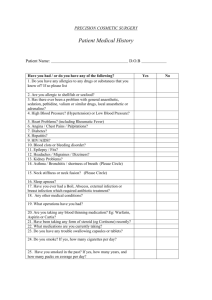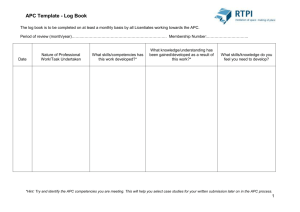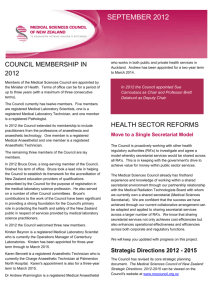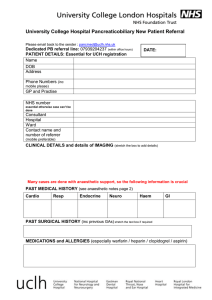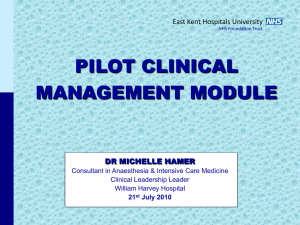Anaesthetic Technicians - Medical Sciences Council of New Zealand
advertisement
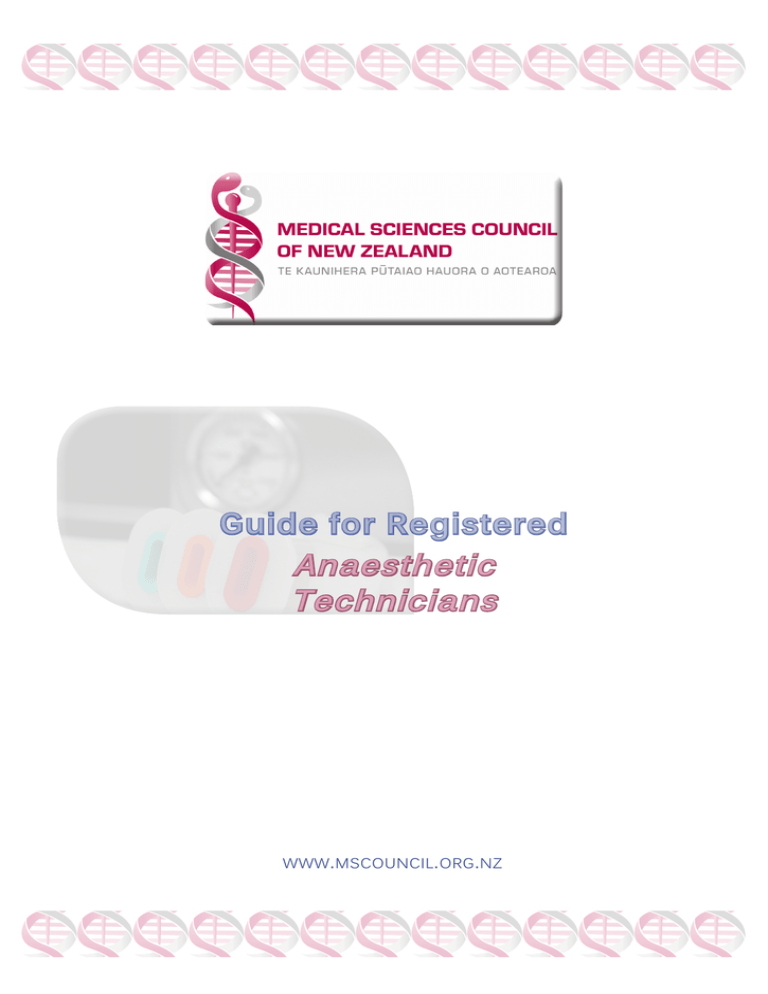
Guide for Registered Anaesthetic Technicians www.mscouncil.org.nz G uide for R egistered A naesthetic T echnicians © This publication is copyright to the Medical Sciences Council of New Zealand October 2014 The Medical Sciences Council of the is responsible to the Health Practitioners Competence Assurance Act 2003 Medical Laboratory Science The Minister primary responsibility of the Council and of Anaesthetic Technology. is to protect the health and safety of the Anaesthetic Technology for administration in respect of the professions of public by ensuring practitioners registered in the professions of and Health New Zealand Medical Laboratory Science are competent and fit to practise. PO Box 11-905, Wellington 6142 www.mscouncil.org.nz F: +64 4 381 0270 E: msc@medsci.co.nz What is Covered in this Booklet About the Council 2 The Value of CPD 13 Council Functions 3 CPD and the APC 13 Registration4 CPD Audits 14 The Profession of Anaesthetic Technology 5 Exemptions14 Scope of Practice 5 Expanded Practice 6 Principles of Expanded Practice Pre-Requisites for Expanded Practice Professional Standards 16 Principles of Natural Justice 16 Competency to Practise 16 6 Raising a Competency Concern 16 6 Competency Review Process 17 Professional Conduct 18 A Mental or Physical Health Condition 18 Applications6 Keeping the Council Informed 9 Annual Practising Certificates 10 How to Apply for your APC 10 Practising without an APC 11 Continuing Professional Development Ceasing to Practise and Returning to Practise20 12 Ceasing to Practise 20 What is CPD? 12 Returning to Practise 20 Continuing Competence Requirements 12 Frequently Asked Question’s 21 What Happens if the Council Decides to Undertake a Health Review? 19 About the Council The Medical Sciences Council of New Zealand (the Council) is one of sixteen New Zealand health regulatory authorities appointed by the Minister of Health under the Health Practitioners Competence Assurance Act 2003. The Council is unique in that it is the first regulatory authority operating under the Act to accept the responsibility for the statutory regulation of clinically disparate health professions: • Medical Laboratory Science; and • Anaesthetic Technology The primary responsibility of the Council is to protect the health and safety of the New Zealand public by ensuring practitioners registered in the professions of medical laboratory science and anaesthetic technology are competent and fit to practise. Vision To provide medical science and anaesthetic technology practitioners with a framework to deliver best practice health care services for the New Zealand public. Page 2 of 22 Medical Sciences Council of New Zealand Council Functions In accordance with Section 118 of the Health Practitioners Competence Assurance Act 2003, the Council is responsible for fulfilling a number of functions: Prescribe the qualifications required for scopes of practice for the health professions it regulates, and for that purpose, to accredit and monitor educational institutions and degrees, courses of studies, or programmes. Authorise the registration of medical laboratory science and anaesthetic technology practitioners under the Act, and to maintain registers. Consider applications for annual practising certificates. Review and promote the competence of health practitioners registered with the Council. Recognise, accredit, and set programmes to ensure the on-going competence of health practitioners registered with the Council. Receive and act on information from health practitioners, employers, and the Health and Disability Commissioner about the competence of health practitioners registered with the Council. Notify employers, the Accident Compensation Corporation, the Director-General of Health, and the Health and Disability Commissioner that the practice of a health practitioner registered with the Council may pose a risk of harm to the public. Consider cases of health practitioners registered with the Council who may be unable to perform the functions required for their relevant scope of practice. Set the standards of clinical competence, cultural competence, and ethical conduct to be observed by health practitioners registered with the Council. Liaise with other authorities appointed under the Act about matters of common interest. Promote education and training in the health professions regulated by the Council. Promote public awareness of the responsibilities of the Council. Guide for Registered Anaesthetic Technicians Page 3 of 22 Registration Under the Health Practitioners Competence Assurance Act 2003 (HPCA Act 2003), the Council is required to maintain a register of practitioners it regulates. The register is accessible to the public and employers. Registration with the Medical Sciences Council is a one-off process. You will remain on the register unless you request to be removed or are removed as ordered by the Council. The Council conducts on-going reviews of the register, and contacts practitioners who have not held an APC for five consecutive years to confirm if they wish to remain on the register. Now that you have been registered your name has been entered into the register and can be found on the Council’s website: www.mscouncil.org.nz/the-register. Once registered you will need to apply for an annual practising certificate before you commence practising. To do so, go to the website and click on “apply for APC”: www.mscouncil.org.nz If you intend to practise in New Zealand, you must hold a current annual practising certificate. It is illegal to practise as an anaesthetic technician without an APC Page 4 of 22 Medical Sciences Council of New Zealand The Profession of Anaesthetic Technology The Council has adopted the following definition of the profession of anaesthetic technology: Anaesthetic technology is the provision of peri-operative technical management and patient care for supporting the provision of quality health care and safe anaesthetic services in New Zealand certified health care facilities. Tasks included in this definition but not limited to, are: • Anaesthetic related research and development • Applied science and anaesthetic technology education • Advanced patient monitoring • Collection of samples for diagnostic investigation • Management The profession of anaesthetic technology contains one scope of practice of an anaesthetic technician. Scope of Practice The Council specifies the anaesthetic technician scope of practice as: An anaesthetic technician is a member of an anaesthetic care team, working collaboratively with other health professionals. An anaesthetic technician: • Utilises technical and clinical judgment to assess peri-operative requirements and provide patient care and assistance during all aspects of anaesthetic administration and during anaesthetic related procedures. • Cannot prescribe and/or administer agents used for general anaesthesia and/or sedation independently. Administration of anaesthetic agents can only occur in an assisting role under the direction of a medical anaesthetist or intensive care specialist. • Provides support to the medical anaesthetist or intensive care specialist and collaborates and works alongside other health professionals during peri-operative, interventional and investigative procedures. • Provides anaesthetic assistance in operating departments, and any other area where anaesthesia is administered. • Provides support for the safe transportation of patients, both within the hospital environment and/ or between hospitals or surgical healthcare facilities. • Works as a team member alongside other health workers. • Provides physical and emotional support to the patient to enhance the safe outcome of anaesthetic procedures. • Anticipates and prepares the equipment, monitoring and other requirements specific to each anaesthetic procedure. The Council’s Competencies for Anaesthetic Technicians describe the skills and activities of an anaesthetic technician. Guide for Registered Anaesthetic Technicians Page 5 of 22 Expanded Practice Expanded practice is where an anaesthetic technician undertakes activities that are in addition to the minimum competencies of the anaesthetic technician scope of practice, and which have been approved by the Council. Expanded practice activities must be in the sphere of anaesthesia-related practise within perioperative medicine, and are carried out under the direction of a nominated anaesthetist or intensive care specialist. Principles of Expanded Practice Expanded practice must be focused on meeting patients' needs and improving patient outcomes, and must meet an identified gap(s) in health services. Practitioner’s working in an expanded role must have the required knowledge and skills and have the necessary supports to continue in that role. Pre-Requisites for Expanded Practice You can only undertake expanded practice activities once you have been approved to do so by the Council. An application is made to the Council as part of the issue of an APC. As at 1 June 2013 the Medical Sciences Council has approved two expanded practice activities within which registered anaesthetic technicians can practise: 1. Peripherally Inserted Central Catheters - PICC Lines; and 2. Post-Anaesthetic Care Unit - PACU Applications Approval to undertake an expanded practice activity is a two-step process. Firstly, you must apply to the Council for approval to undertake a training programme in a specified expanded practice activity. Approval will be endorsed through the Council issuing an APC that contains the condition that you work under the supervision of a nominated anaesthetist/intensive care specialist for the duration of the training programme. Once you have completed the training programme, you must provide the Council with documented evidence that you have met all the requirements of the healthcare facility’s training programme for a specified expanded practice activity. Page 6 of 22 Medical Sciences Council of New Zealand Applications for the Training Programme Practitioner’s wanting to undertake a training programme in an expanded practice activity (that is on the Council's approved list), must complete an Expanded Practice Training Programme Application form. This is available on the Council's website at: www.mscouncil.org.nz Completion of the application form includes signed confirmation from the Clinical Director (or similar position) of the anaesthesia department of the relevant healthcare facility, that the training programme includes all of the requisites as stated on the application form, and confirms you meet the pre-requisites of the training programme If the Council approves your application, an APC will be issued with a condition that you work under the supervision of a nominated anaesthetist or intensive care specialist for the duration of the training programme. Application to Practise in an Expanded Practice Activity Once the training programme has been completed, and/or you have been certified as meeting all of the required competencies for undertaking a specified expanded practice activity, you must apply to the Council to have that included as a condition on your scope of practice. The initial application can be made by completing an anaesthetic technician expanded practice application form. This form can be downloaded from the Council's website by clicking on the anaesthetic technician button, and is located under the Publications tab. All expanded practice applications are to include the following supporting documentation: • Evidence of meeting all training programme requirements; and • Confirmation of competence to perform all competencies required for the expanded practice independently; and • Evidence of successfully completing an annual assessment; and • Completed logbook; and • Evidence of meeting the minimum number of clinical hours/procedures. Guide for Registered Anaesthetic Technicians Page 7 of 22 On-going Expanded Practice Certification If you have been approved by the Council to work in an identified expanded practice activity, you are required to apply to have that included as a condition on your scope of practice for each APC year you wish to continue working in that expanded practice activity/activities. Expanded Practice and Continuing Professional Development You will need to provide evidence of continuing professional development (CPD) activities that relate to the expanded practice activity/activities which have been included as a condition on your scope of practice. The annual requirement for engagement in 20-hours CPD activities, at least 25% of those CPD activities should have a direct relationship to the anaesthetic technician's expanded practice role. Page 8 of 22 Medical Sciences Council of New Zealand Keeping the Council Informed You are required to notify the Council of any changes to your residential, postal or work address within one month of the change. You can do this by logging into “My Profile” on the website. Please note email address changes cannot be altered using the “My Profile” portal and must be emailed to msc@medsci.co.nz Guide for Registered Anaesthetic Technicians Page 9 of 24 Annual Practising Certificates If you wish to work in New Zealand as an anaesthetic technician you must hold a current annual practising certificate (APC), and you must hold it each year you intend to practise in New Zealand. An APC is valid for a maximum of twelve-months between 1st April of one year and 31st March of the next year. An APC may be issued for part of the relevant twelve-month period. If you are a current holder of an APC you will be notified by the Council in January/February of each year of the need to renew your APC, unless you have otherwise informed Council that you will not be practising in that period. How to Apply for your APC The Council only accepts APC applications through its on-line system. Go to the Council’s website and click on the “Apply for APC” button and follow the instructions provided on the screen. You will be required to pay a fee of $345.00. Page 10 of 22 Medical Sciences Council of New Zealand Declarations When you apply for an APC you are required to make a number of declarations including that you: • Have received a satisfactory performance evaluation within the previous twelve-months; and • Have met the requirements for clinical work experience; and • Have no criminal convictions recorded against your name and/or no criminal charges pending that are punishable by imprisonment for a term of 3 months or longer*; and • Completed a minimum of 1104 hours of clinical practice within the last three-year period; and • Are competent and fit to practise, and have no mental or physical conditions that may compromise your competency. Please note: Declarations must be truthful. The Council may take action under section 172 of the Act if it discovers any declarations are false. Practising without an APC As a practising anaesthetic technician you are responsible for ensuring you hold a current APC, and work within your registered scope of practice. An application renewal is to be submitted to the Council for each year you intend to work in New Zealand, and must be accompanied with the appropriate payment. It is illegal to practise without an APC and you could be fined up to $10,000, should the Council have it confirmed you have been working without a current APC. *This includes convictions that have not resulted in an imprisonment term, but could have been; for example a conviction of driving with excess breath alcohol. Guide for Registered Anaesthetic Technicians Page 11 of 22 Continuing Professional Development Active engagement in continuing professional development (CPD) is a way for you to demonstrate your on-going competence so you can be re-issued with an APC. Anaesthetic technicians registered with the Council are required to maintain their competence under the Health Practitioners Competence Assurance Act 2003 (the Act). What is CPD? The ultimate purpose of CPD is to contribute to high-quality patient care. Put simply, CPD is the way you continue to learn and develop throughout your career so you keep your skills and knowledge up-to-date and are able to work safely, legally and effectively. While the definitions of CPD are many they tend to be based on a number of common themes. The Council considers the following definition a reasonable description of the underlying principles for the CPD framework it has adopted for anaesthetic technicians: “Continuing professional development is a range of learning activities through which health professionals maintain and develop throughout their career to ensure that they retain their capacity to practise safely, effectively and legally within their evolving scope of practice” Health Professions Council (United Kingdom) Continuing Competence Requirements All anaesthetic technicians must maintain their competence to practise by: • Completing 60 hours of CPD in the last three years, (the Council recommends practitioners obtain 20-hours CPD for each year). Anaesthetic technicians must provide the Council with evidence of their competence by: • Stating a self-declaration of their competence when applying to renew their APC; and • Having a third party (that is, a registered anaesthetic technician who holds a current practising certificate and has no conditions on their scope of practice) sign a declaration, as a component of the APC renewal process of their competence to practise as an anaesthetic technician; and • Maintaining a record of their continuing competence/continuing professional development activities. Page 12 of 22 Medical Sciences Council of New Zealand The Value of CPD CPD will help you to maintain high levels of professional competence through continually upgrading your skills and knowledge. CPD: • Ultimately benefits patients as it should lead to improved peri-operative services • Gives the Council, the public, and the health sector confidence you are continuously improving your skills, knowledge and expertise • Allows for you to take responsibility for your lifelong learning • Fosters excellence in the anaesthetic technology profession • Helps you to be accountable for remaining current in your practice • Enhances your professional image and ability to work in different areas • Helps with your future career prospects • Can be used to plan career changes CPD and the APC Recertification is the term used for the process through which you demonstrate your competence to practise as an anaesthetic technician, and for the Council to issue you with an APC. Before the Council issues you with an APC, you must be able to demonstrate that you are participating in CPD. You are responsible for managing your own CPD so as to demonstrate you are continuing to meet the competencies required to practise as an Anaesthetic Technician. How much CPD is Required? As a minimum you must be able to demonstrate that: • You have a documented annual Professional Development Plan; and • You have undertaken a minimum of 60 hours of CPD for each three-year CPD period, (the Council recommends practitioners obtain 20-hours CPD for each year); and • Over the three-year CPD period you have undertaken at least one CPD activity in three of the four learning categories defined and approved by the Council; and • For each CPD activity undertaken you have supporting documentation as evidence of your participation in that activity. Your CPD records must show how each of the CPD activities have impacted on your everyday clinical practise as an anaesthetic technician. (This is commonly referred to as reflective practice). Guide for Registered Anaesthetic Technicians Page 13 of 22 CPD Audits Anaesthetic technicians engaged in the Council-managed Continuing Competence Programme will be subject to an audit. The audit is managed through MSS and undertaken by members of the profession as appointed by Council. Selection of practitioners will be on a random basis and each audit will target 10% of registered anaesthetic technicians who hold a current APC. Exemptions While you can apply to the Council for an exemption from a CPD audit, this is an exception rather than the rule and is only a temporary privilege. Being away on parental leave for any period within a CPD programme cycle is one situation where the Council may grant an exemption. All requests for exemption are to be submitted to the Council when you apply for your APC. You may email these requests to msc@medsci.co.nz. MSC: Continuing Competence Programme The Council-managed programme offers one option for anaesthetic technicians in respect of recording their continuing competence/professional development activities. A Professional Portfolio Practitioners must be able to: • take responsibility for their own learning and development; • reflect on their work; • record, critique and evaluate their learning, performance, and development. Page 14 of 22 Medical Sciences Council of New Zealand The Professional Portfolio covers the following key aspects: Work-Based Professional Activities Learning gained from the work you do within your Learning gained from your involvement as an professional environment Anaesthetic Technician • Completed case study reports • • Minutes from meetings Minutes from professional meetings including identification of your attendance and contribution to the meeting • Peer review document (including identification • of both parties) Standards/guidelines that include identification • Record of participation in quality improvement activity of your involvement • Research article or progress report • Letters/forms/questionnaires • • In-service attendance records Record of participation as a supervisor - e.g. contract • Discussion group subject and list of attendees • Record of participation as an assessor/ advisor/auditor/mentor • Meeting attendance records • relevant meetings/project Formal Education Presentations including personal identification Self-Directed Organised study/learning and presentations either Learning generated by you and that is relevant to as a recipient or a provider of education your professional practice • Course certificate • Academic transcript • Evidence of participation in research • Course materials you have produced • Articles you produced for publication Guide for Registered Anaesthetic Technicians • Internet search - search criteria and highlighted article or with a written summary downloaded from website • Course assignments • Record of observation with personal notes • Retained articles with annotated notes • Précis or review notes of books/DVDs • Critical literature reviews that you have written Page 15 of 22 Professional Standards As a registered health professional you have a responsibility to notify the Council if you have any concerns about either your own or another practitioner’s: • Competence to practise; and/or • Professional conduct; and/or • A mental or physical health condition When concerns are raised about a registered health practitioner's standards of professional practice, the Council is required, to respond to such concerns, and at times will refer notifications to a Professional Conduct Committee. Principles of Natural Justice The Council is often asked, “how do we know if a practitioner is being investigated?” The answer is you don’t. Once an investigation has been completed, any conditions imposed on a practitioners record can be viewed on the register. Competency to Practise If concerns are raised about your competence as a registered anaesthetic technician, the Council is compelled to make enquiries and consider whether a review of your competence is necessary. A competence review is not disciplinary in nature. Rather, it is designed to protect the public by making an assessment in a collegial manner and to be educative with a focus on assisting you to improve your standard of practise. Competence reviews undertaken by the Council are to be fair, constructive, supportive and educative. Raising a Competency Concern The Council may review the competence of practitioners if there is reason to believe they have not maintained the required standard of competence, and/or there is evidence to suggest they pose a risk of harm to the public • An employer must notify the Council when a practitioner has resigned or been dismissed for reasons relating to competence; • Any health professional may notify the Council of a competence issue; • Professional Conduct Committees appointed by the Council may also recommend a competence review Page 16 of 22 Medical Sciences Council of New Zealand All competency related concerns are to be stated in writing to the Registrar and to include the reasons why the person making the notification believes the practitioner may pose a risk of harm to the public by practising below the required standard of competence. Competency Review Process The Council informs the practitioner of the notification and makes further inquiries before deciding if a review is required. The Council may choose to make further inquiries through: • Interviews with the practitioner concerned, colleagues, employers or patients; and/or • Observations of the practitioner concerned. Competence reviews are undertaken by a Council-appointed panel of at least two people, one of whom is a Council registered practitioner who holds a current practising certificate in the same scope of practice under review. It is important to note, competence reviews are rehabilitative in nature; that is, they are aimed at working together with the practitioner to find ways to assist them to bring their standards of practise in line with the Council’s competencies required for the particular scope of practice. Competency review panels are provided with a detailed terms of references within which the review is to be conducted and the practitioner under review has an opportunity to comment on both the membership of the competence review panel and the terms of reference. Following a review, the panel must make a recommendation to the Council, and could recommend: • A competence programme designed to assist the practitioner to address the areas identified; and/or • Refer to Health Practitioners Disciplinary Tribunal; and/or • An alteration on the practitioners scope of practice by including: * Conditions on their practise; and/or * Changing the health services a practitioner may perform. The practitioner has an opportunity to respond to any order proposed by the Council following its consideration of the panel’s recommendations, and prior to any order being put into effect. Guide for Registered Anaesthetic Technicians Page 17 of 22 Professional Conduct Should the Council receive a complaint alleging that a practitioner’s practise or conduct as a Council registered practitioner may pose a risk of harm or serious harm to the public, the Act enables the Council to appoint a professional conduct committee (PCC) to investigate that complaint. A PCC conducts its investigation independent of the Council. Should the Council be notified that a practitioner, having been convicted in a New Zealand Court of an offence punishable by imprisonment for a term of three-months or longer or any other offence as per section 67 of the Act, they will immediately refer them for investigation by a PCC. For example a drink driving conviction, that is punishable by a three month prison sentence; even if the sentence is not carried out. A Mental or Physical Health Condition If a registered practitioner cannot make safe judgments, demonstrate acceptable levels of competence or behave appropriately in accordance with ethical, legal and practise guidelines because of a mental or physical condition, they can expect to be investigated by the Council. In determining if an investigation into a practitioner’s health is appropriate, the Council’s Professional Standards Committee may consider the following factors as increasing the likelihood for a health review to be undertaken: • An incident directly involving the use or misuse of drugs and/or alcohol; • Evidence of stress factors in the practitioner’s personal and/or work environments; • Evidence of physical or mental illness; • Evidence of a previous mental or physical episode which adversely affected the practitioner’s practise Page 18 of 22 Medical Sciences Council of New Zealand What Happens if the Council Decides to Undertake a Health Review? You are invited to comment on the health concern that was brought to the Council’s attention including any factors that may adversely affect your ability to practise. If you acknowledge that your practise is affected by a health condition, the Council may discuss an option for you to voluntarily either limit your practise or cease practising while the situation is investigated further. The focus is on assisting you to address any mental or physical health issues which may be affecting your practise. You may be asked to surrender your APC or to put into affect any agreed limitation on practise. (If appropriate a replacement annual APC with conditions can be issued at a later point at no extra cost to you.) If satisfied that it is appropriate to investigate the matter as a health issue, the Council will require you to undergo a medical examination by a medical practitioner approved by the Council. You are able to have a support person of your choosing attend the examination as an observer. Following the examination, the medical practitioner is required to advise the Council in writing: • The existence of the alleged condition; • The results of all tests carried out as part of the examination; • The extent to which they believe any condition found to exist affects your ability to practise the functions of your profession safely and competently; • Any recommendations for on going monitoring. If the Council finds you are suffering from a mental or physical condition that affects your ability to practise, they may impose one of the following: • Suspension or conditions on practise; • Variation of conditions on practise; • Monitoring The Council may revoke conditions placed on an APC under s51 of the Act, if they are satisfied you are again able to practise at a satisfactory standard. Guide for Registered Anaesthetic Technicians Page 19 of 22 Ceasing to Practise and Returning to Practise Ceasing to Practise If you stop practising you are not required to hold an APC; however you must contact the Council to advise the date you intend to stop practising, and whether you wish your name to remain on the register. Returning to Practise If you have not held an APC or worked in the profession of anaesthetic technology within the last three-years, you must be able to demonstrate to the Council that you are competent to practise as an anaesthetic technician in New Zealand. If you wish to return to work in the scope of practice of an anaesthetic technician, you will need to apply to the Council for an APC. Registered anaesthetic technicians returning to the workforce who have not held an annual practising certificate or practised the profession within the last three-years will need to notify the Council. There is a process for returning to work practitioners depending on the length of time out of practise. If you have New Zealand registration and have not practised here for over three-years, but have been working in an overseas healthcare facility, you may be required to provide the Council with letters of good standing from the relevant employers. You must hold an APC before you commence practising. Page 20 of 22 Medical Sciences Council of New Zealand Frequently Asked Question’s Q. What does APC stand for? A. APC is an abbreviation commonly used amongst all health regulation authorities. It stands for Annual Practising Certificate Q. Does an APC have any time limitations A. Yes. An APC is issued for up to a maximum of twelve-months, and is valid from 1 April (or application date) to 31 March of the following calendar year. Q. What’s the difference between registration and an APC? A. Once you are registered with the Medical Sciences Council, you do not have to re-apply for future registration in that scope. An APC allows you to practise in your registered scope of practice in New Zealand. For each year you want to practise you will need to hold a current APC. Q. Can I be registered and not hold an APC? A. Yes. You can be registered without having to hold an APC. However, as soon as you want to practise in a New Zealand, you must hold an APC. Q. I’m currently overseas. Do I have to apply for an APC once I’m registered? A. No. You may be registered with the Medical Sciences Council while living outside of New Zealand. However, an APC is only issued if you are resident in New Zealand. The Council may issue you with an APC in anticipation of your moving to New Zealand on the proviso of receiving appropriate supporting documentation. Q. Can I refuse to have my name published on the register? A. No. The HPCA Act 2003 requires the Council to publish and maintain a public register of all practitioners registered with the Medical Sciences Council. Guide for Registered Anaesthetic Technicians Page 21 of 22 Notes Page 22 of 20 Medical Sciences Council of New Zealand Contact Details Level 10, ASB House PO Box 11-905 101-103 The Terrace Wellington 6142 Wellington 04 801 6250 msc@medsci.co.nzwww.mscouncil.org.nz Medical Sciences Council of New Zealand
